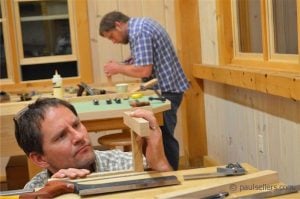Starting Out on Your Own

This is a part of series I am about to launch. It’s not just about spoon making though, it’s about working in your own business, working from home and becoming a woodworking artisan. How many spoons you have to make to match your present salary may be running through your mind and of course that is very much part of the issue, but what would you say if the skill it takes to make a spoon is just one of many that makes your business work. Looking back on my past work as a craftsman is quite a story. Where to start is a little difficult but I think the issues of starting businesses parallels much of my reason for blogging and teaching and answering the hundreds of questions that come in every month. I started with spoons because the more impossible things seem sometimes, the more possible things become. What would you say if I told you that this week I received a commission for 35 hand made spoons. It was totally unsolicited and unexpected, but then that’s how my life has always been and wouldn’t change a thing.

I suppose there has been a marked improvement in store-bought spoons over the recent years. In fact, I would say imported spoons far out class what was made and accepted in the pre-millennia years before the internet market developed to the level we now know it. Many spoons made for the western market are fairly inexpensive and often made from beautiful hardwoods so, why make your own and why would people buy yours.


Sometimes I think it’s harder to persuade ourselves that there might actually be a clientele interested in buying any of our hand work and whereas there may not be what we commonly refer to as ‘demand’, there are people who relate to craft and craft work differently than mere consumers do. We often refer to these people as clients, customers, patrons and other such titles. In reality, these people are more friends of the artisan and need only to hear how you work. where you work, what you make and why you make what you make as a counterculture to mass made stuff from Asia and other foreign climes. Tackling this issue is indeed a big one. The answer is not in reproductive mechanisms although they could play a part. Tell any customer that your piece will be made by CNC router and you cooked your goose before you start. Show them art work and description about your product that reflects the chosen lifestyle of a crafting artisan and things can quickly change. My furniture never was cheap. Alongside $5,000 pieces of furniture I sold wooden spoons carved by hand for $20 and up. That started in 1987 and continued until five or so years ago. I taught my sons to carve spoons and they sold them too.
How many spoons and birdhouses can I get from these logs?

Over the next few weeks I will be developing a series of articles that will help you toward becoming what I call a new-genre lifestyle-woodworker.

If it were not true that about 30% of my students want to do just that, I would be lying. I think that they represent a healthy percentage of people who want to get off the conveyor belt, become entrepreneurs and at the same time spend more time with their families, work from or nearer to home and find a sense of value in being creative. I will perhaps take out some of the fantasy but deliver a way that you might consider to be a viable rite of passage.
What about becoming a wooden clog maker?
Many people want to buy locally and will indeed buy something if they know it was hand made by a crafting artisan. Feeling helpless to change the current trend of buying cheap imports and powerless to change anything because of politics, economics and societal changes, is indeed the hardest thing to overcome, but, you know, I think it can be done. Don’t look to politicians for answers. They could never understand any of this and of course it makes no economic sense either.The Power to Change Things

Last week I posted a list of articles I planned on doing and I have already delivered three f them, together with others. I have many more planned and indeed some of the How-to pieces such as spoon making and making canes are the nuts and bolts I want to use to show you what could be done. The article with Dan Faia is the first of many I want to bring to you so that you can here from other artisans besides me. I want to hear from other people too.

Please join me as I combine articles and how-to’s from my life as a lifestyle woodworker who has worked almost 50 years in his craft and has never had one day when he did not have work. Let’s make the Real Woodworking Campaign work together. Let’s offer an alternative to imports and get jobs back on the table for younger people. Let’s become the counterculture that steps off the conveyor belt and see an exciting future unfold. That’s what this blog has always been about from the very beginning. I have now trained over 4,000 woodworkers from around the world and with our new, unfolding future moving creatively forward I see new possibilities ahead.


“Let’s become the counterculture that steps off the conveyor belt and see an exciting future unfold.”
I’m in. I’ve just finished year one of three as an apprentice carpenter in Germany, and it is partly because I want to do something like this. Unfortunately the local ‘wisdom’ is that making money with traditional craftsmanship is impossible and you need several hundred thousand Euro’s worth of machines and a CNC router that costs the same as a house to even think about making money out of woodworking, and even then you’ll basically be making shelves out of chipboard. Any suggestion that I could work with hand tools is met with derision.
My other challenge is that as a mere carpenter I’m not allowed, in theory, to be self-employed. For that I need to become a master carpenter which is difficult and very expensive and just pushes me further along the same route to industrial carpentry and away from the hand tool based craftwork I want to do. What I can do is call myself something else like an ‘Artisan Woodworker’, although it remains to be seen if I’d get a single customer that way.
I have a few ideas, but your advice and suggestions will be very welcome as we try and work out how to go forward with this and feed a growing family…
People have told me all of my life that you can’t do this or that. They’ve told me that you must have this or that amount of money to start this business or that business and yet with a made up mind and a shift in perspective about how you want to live you can join the ranks of those who make a difference. Yes, they made me consider things, to be cautious, but thats not necessarily a bad thing. just don’t let it stop your aspration and dream from becoming reality. We all need income and to pay our bills. Growing a family and having time to be a part of it seems the more scarce thing these days, but I recall different times in my life when a simple decision to stay off the conveyor belt meant deeper relationships with people I cared about. One of the many things I love about the USA is that there is still a sense of adventure and that, yes, you can do it. I feel that in Britain too. There are many sub-cultures that somehow defy the kind of authoritarianism you speak of, where people respect those who do defy conventionalism in some measure to carve and shape their personal identity in becoming and living as an artisan true to his and her craft.
I find this course of discussion very interesting because of the manner in which I am employed. I have been fortunate in a way that work has nearly always been a constant even when not being looked for. I do not have any qualifications officially in carpentry (I do have a BA in Industrial design which is very useful and applicable) and yet a very large amount of my work is in this field. I have found that the ability to self educate-whilst not as comprehensive as a practiced craftsman teaching you, is invaluable. If you are able, finish your apprenticeship and learn everything you possibly can and access whatever facilities are at your disposal including the skills of researching. Knowledge is powerful. My position in employment in Australia is loosely termed as “handyman”. Lateral thinking and trade skills related to the workings of a job can easily translate from wood to anything. I was once paid for a day and a half to hang three hundred pictures/photos in a private residence- I was staggered that someone wanted to do this, I actually ran out of appropriate fasteners on the first day. Domestic housing and commercial premises require maintenance and replacement work continuously. In Australia we have major issues with termites attacking timber. The older houses have timber floors that have a void underneath which requires inspection on a yearly basis to avoid damage and facilitate treatment with no means of access. Cutting a neat and serviceable trapdoor into the floor is tricky due to the old nails and uneven floor joists and to ensure it does not rock around and can be lifted and reinstated is time consuming. It is hard on your tools as well (we have lots of sand/silica that gets everywhere). It can be profitable, the last one I did required repairwork to the sub floor as well and took a full week. Retrofitting anything to inbuilt cabinetwork in situ is very difficult to achieve with a factory full of machinery but for a tradesperson onsite quite achievable. Flatpack furniture can actually become interesting-especially when the client wants it modified to suit something specific. I could cite examples of work for another hundred lines and bore everyone to tears because there really is that many different things that relate to the skills you are learning. Find out what insurances you require by law to operate and to protect yourself. I need vehicle , public and property liability, wages, health and tool insurance as a minimum as I too have a family. Figure out your turnover required to cover your daily expenses such as these and wear and tear on your equipment. Allow for the time required when not working on a job but still working on your business- for you will be a business man. You need to cover bookeeping/accounting costs, equipment costs, your own tool maintenance etc. Learn to judge your customers as they will judge you, some are fair-some are not. You must have confidence in yourself to say no to protect your own interests-value yourself. If someone wants credit make it clear that you will charge accordingly and expect to be paid-they usually don’t enquire after that. Your time is valuable, figure out an hourly rate and stick to it. I hope this helps a bit ,I have been self employed now for 20 years and the learning never stops, especially with this wonderous resource we have at our disposal whenever we want with people such as Paul instructing, enticing and inspiring.
“Let’s become the counterculture that steps off the conveyor belt and see an exciting future unfold.”
I’ve probably been in a dozen conversations this year alone about “the state of the world” in the economic, political, geopolitical, and ethical sense. And at the end of each one I’ve tried to sum up my feeling that IF there is a way out of the mess we’ve made for ourselves and the next generation then it’s in what I see some young families doing. They ARE getting off the conveyor belt, they ARE living rich lives instead of living their lives for riches, and in general they’re a hell of a lot more aware than I was at their age.
And I’ve been kind of jealous of them that I didn’t understand this until after I was sidelined.
I look forward to this series of articles on several levels. I have hopes that it will allow me to become a participant, in a small way, instead of merely a cheerleader for this new approach to life.
John Purser
Well said Mr. Sellers! I’ll do my very best to further the movement. Godspeed.
hi paul
i think its all down to ones attitude and taking risks, which most people stuck in the rat race dont seem to grasp.
what you put in you get out. as in the energy and love for what ever.
i only started wood craft about 10 months ago,
i began making small crossbows, out of little wooden ice-cream handles .i made quite a few and a friend was amassed at how accurate and powerful my little crossbow,s were i then made target,s out of balsa wood, and my friend wanted to record on his phone ,me shooting a bolt (arrow) into the target which i did. my friend wanted to buy one from me but i just gave him one then i put one on ebay for sale which i sold one for £6.99 and it was nothing to do with the money but i was so elated that someone left me positive feedback from something i made using my hands ,i then fell in love with woodwork and have made quite a few items plus 3 workbenches of which one i made from a pallet of wood,which has become my sawing and sharpening station. i have learnt so much from you paul from winding sticks to the poor mans tools and so on, when i’m away from my workshop i cannot wait to get back home to my workshop. im a toolaholic now as well , and love tool;s made by record,ashley isles, robert sorbey , marple;s and the stanley made in England like the hand router,absolutely love working with wood, and i must thank you paul for sharing your knowledge skill and admiration of you love for wood,and the laughter with some of the joke,s you come out with. please keep doing what your doing im not blowing smoke nor am i blowing your trumpet but i truly believe you are one of the best woodworker’s on this planet. take good care and thank you once again your a diamond .
best wishe’s
kenny